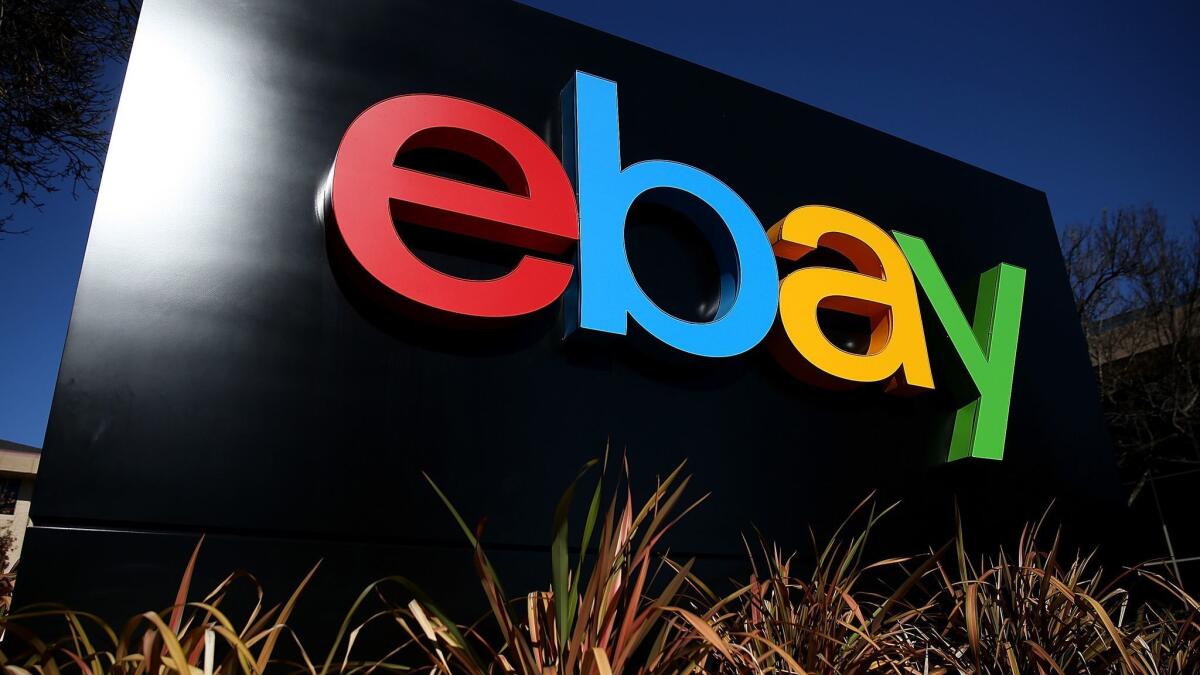EBay has a stark choice: Show growth or break into pieces

EBay Inc. Chief Executive Devin Wenig has long argued that the 24-year-old online marketplace can thrive in the age of Amazon by not being like, well, Amazon.
EBay has no Prime-style subscription and makes a big deal about helping shoppers discover products rather than shopping with a product in mind as they typically do at Amazon.com Inc. To compete against his larger rival, Wenig has tried to freshen EBay’s image with younger shoppers, made the site easier to navigate and harnessed artificial intelligence to give EBay merchants real-time insights about what shoppers want and how much they’re willing to pay.
Wall Street bought the story for a while, but with Amazon gaining and EBay atrophying, investors have been losing patience with Wenig’s slow-and-steady approach. That impatience came to a head Tuesday, when billionaire Paul Singer’s Elliott Management Corp. — which owns more than 4% of the company — published a letter outlining “urgently needed” steps including asset sales and share buy-backs.
EBay’s growth was languishing even before Wenig took over in 2015 after the company split from faster-growing PayPal Holdings Inc. Many shoppers still think of EBay as the online rummage sale of yesteryear, where you could snag a deal on someone’s baseball card collection or video game console by bidding in an auction. In fact, EBay is much like any other e-commerce site these days, replacing a trip to the mall by offering deals on new iPhones, Under Armour shirts and DeWalt cordless drills.
Wenig has increased EBay’s marketing budget and launched a rebranding campaign to freshen its image in an attempt to appeal to younger shoppers — especially women — with an emphasis on inventory they want, such as clothing. He is also pushing EBay deeper into digital advertising and a new payments business to replace PayPal, both of which Wenig sees as billion-dollar revenue opportunities.
Differentiating EBay from Amazon is the centerpiece of Wenig’s strategy. He has stopped competing where the Seattle leviathan arguably has the biggest advantage: the speedy delivery of everyday merchandise. Instead, Wenig wants shoppers to come to EBay when they’re planning vacations and need supplies, refreshing a wardrobe or curious about the latest gadgets. Wenig’s changes have accelerated growth, but Amazon keeps leaving it further in the dust.
EBay sues Amazon, alleging a years-long scheme to poach sellers and dodge detection »
In down quarters, Wenig has pleaded for investor patience regarding his “structured data initiative,” which aims to make the site easier to navigate, more visible in Google searches and able to provide personalized recommendations to shoppers. Searches on the site bring consumers to product pages where they can further refine their hunt, rather than to a seemingly endless string of individual listings. Job cuts last year targeted projects that weren’t paying off so EBay could put more resources into things that were working.
But investors are mindful that the company is growing more slowly than e-commerce overall and is losing market share to Amazon, Walmart Inc. and Target Corp. Wenig’s strategy showed promise in 2017 and early 2018 when growth of gross merchandise volume — the total amount of money people spend on the site — accelerated from low single-digits to 13% in the first quarter of 2018. But the momentum faded, and that growth slowed to 5% in the quarter that ended Sept. 30.
Elliot Management’s letter will force Wenig and his board to consider selling ticket seller StubHub and other assets to generate money to invest in the marketplace and eliminate distractions. Many look to the spinoff of PayPal, which was championed by activist investor Carl Icahn. That split created two pieces more valuable than the whole.
“We have been a very loyal EBay shareholder and we have gotten wealthy owning this,” said Bill Smead, CEO of Smead Capital Management Inc., which owns about a 2.5% stake in the company. “It certainly didn’t hurt a thing the last time they spun out a business.”
Shares of EBay climbed 6.1% on Tuesday to $32.90.
Soper writes for Bloomberg.
More to Read
Inside the business of entertainment
The Wide Shot brings you news, analysis and insights on everything from streaming wars to production — and what it all means for the future.
You may occasionally receive promotional content from the Los Angeles Times.










